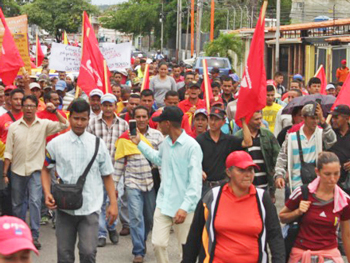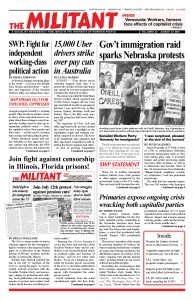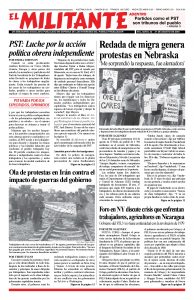
In the midst of a deepening economic crisis that is devastating workers and farmers, Venezuelan President Nicolás Maduro announced measures July 25 to give more concessions to capitalist owners. He seeks their help staunching the collapse in production, winning foreign investment, renegotiating the foreign debt and tamping down out-of-control inflation.
The new measures include a one-year tax exemption on imports of merchandise, machinery, raw materials, seeds and fertilizer; relaxing currency rules to give business owners more access to dollars; and encouraging the use of dollars inside the country.
In addition, Maduro said he was putting new bills in circulation that knock five zeroes off the bolivar notes. The new currency, he said, would be pegged to the petro — a stillborn “cryptocurrency” launched earlier this year — supposedly backed by flagging oil sales.
The half-a-decade-long economic crisis has been exacerbated by Washington’s hostility and interference. The U.S. government has tightened economic sanctions against Venezuelan government officials and institutions and taken other steps to isolate and pressure the government.
A U.S. federal court judge ruled Aug. 9 in favor of Canadian gold mining company Crystallex, saying it can collect $1.4 billion it claims to have lost when late President Hugo Chávez nationalized the gold-mining firm in 2009. This could result in the company taking control and selling U.S.-based oil refineries owned by Citgo, which is part of Venezuela’s state-owned oil company PDVSA.
To give Crystallex and the Venezuelan government time to see if they can reach a settlement, the judge’s ruling won’t take effect for a couple weeks. The court decision opens the door to other capitalist creditors following suit to collect on bonds that Venezuela has defaulted on in the last year.
Prices are soaring, more than double every month, according to some reports. Combined with shortages of food and other basic necessities and collapsing infrastructure, this is making life unbearable for working people. Workers often spend their entire wages on food immediately after getting paid to stock up before the price jumps.
The current minimum wage, which was increased in June to 5 million bolivar a month — equal to either $1.29 or $25 depending on which exchange rate is used — barely buys two pounds of meat, a chicken or a carton of 30 eggs.
Electricity blackouts and water cutoffs are frequent, buses often don’t run and medicines are scarce. Many factories have stopped operating due to lack of raw materials. These conditions have led to protests across the country.
“I am better off selling empanadas than working as a nurse,” said Ana Rosario Contreras, president of Caracas College of Nurses, during a July 6 protest demanding higher wages. “An empanada costs 500,000 bolivars and I get paid 600,000 every two weeks.”
The deteriorating conditions have fueled an exodus of hundreds of thousands of Venezuelans, largely middle-class and professional layers, in recent years. But thousands of workers — desperate to earn enough to feed their families — have increased those numbers, heading to Colombia, Peru, Ecuador and other nearby countries.
Deepening crisis
Venezuela is a capitalist country, where the government attempts to administer capitalist economic relations “for the benefit of all Venezuelans” with “a bent towards the poor.” That was the stated goal of the “Bolivarian Revolution” and what was sometimes called “21st Century Socialism” promoted by late President Hugo Chávez and the Unified Socialist Party of Venezuela (PSUV). President Maduro has continued on this course.
While the government instituted price and currency controls and distributed part of the oil revenues in the form of welfare handouts that cut into the profits and restricted the prerogatives of some bosses and came into conflicts with Washington, it was still a bourgeois government.
The leaders of the Bolivarian Revolution never mobilized working people to take control of production and the land and replace the bourgeois government with a workers and farmers government on the road to expropriating the capitalist class. They rejected the revolutionary example set by workers and farmers in Cuba. That is the only road that offers working people the chance to confront the problems they face.
Peasants fight for land, rights
Despite the challenges and obstacles, many workers and peasants have not been pushed out of politics and are looking for ways to defend their class interests.
In July hundreds of small farmers and their supporters marched 270 miles in 20 days from Portuguesa state to Caracas. They demanded government action against big landowners who forced them off lands they won when Chávez was president. They also faced the complicity of government officials, National Guard, police, judges and prosecutors.
The peasants demanded the government take measures to ensure they can get the materials they need, from seeds to fertilizer to water pumps, to be able to grow food for the people of Venezuela.
This march was “the product of necessity,” said Arbonio Ortega, one of its leaders. “Why did we receive no support from the [PSUV] government of Portuguesa?”
The marchers demanded and won a meeting with President Maduro in Caracas Aug. 2. But hours after the meeting, three peasant leaders from Barinas state who had participated in the march were killed by masked goons. Since 2001 over 350 peasants have been killed by paramilitary thugs employed by capitalist landowners, Orlando Zambrano, a leader of the Ezequiel Zamora Peasant Front, told Radio Mundo Real May 15.
Protesting the preferential treatment given to big capitalist farmers, small farmers from the Maizal Commune, in Lara state, in June took over the premises of Agropatria, a state-run company that supplies farmers with seeds, fertilizers and loans. Their action was provoked by the arrest of small farmers for allegedly trying to buy seeds and fertilizers on the black market.
Washington seeks fall of Maduro
Meanwhile, Washington, Ottawa and governments in Europe and their allies in Latin America are pressing efforts to isolate the Maduro government and to make working people pay the price of the crisis.
“It’s time for Maduro to go,” U.S. Ambassador to the U.N. Nikki Haley arrogantly said during an Aug. 8 visit to Colombia. She called on Latin American governments to step up the pressure. Washington’s goal is to replace the Maduro government with one more to U.S. imperialism’s liking, without having to intervene militarily or provoking a social explosion.
“We demand an end to Washington’s sanctions against Venezuela and its violations of Venezuelan sovereignty,” said Edwin Fruit, Socialist Workers Party candidate for Washington governor. “Hand’s off Venezuela!”

